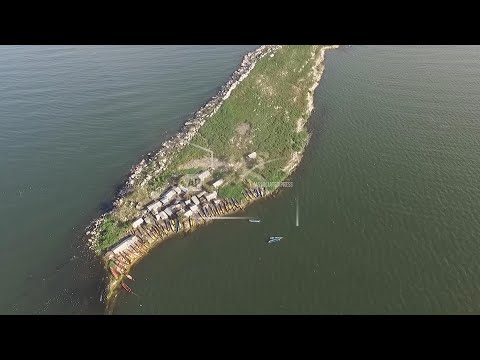(5 Jul 2025)
ASSOCIATED PRESS
Musambwa Island, Uganda – 12 June 2025
1. Drone shot of Musambwa Island ++MUTE++
2. Guide on boat to Musambwa Island
3. Mid of Enock Ntale, Chairman, Musambwa Island Joint Conservation Organization, scooping water out of boat
4. Sign welcoming visitors to Musambwa Island
5. Fisherman tying his boat
6. Various of fishermen preparing their nets
7. Boats
8. Wide of makeshift houses on Musambwa Island
9. Ntale and friend walking
10. SOUNDBITE (Luganda) Enock Ntale, Chairman of Musambwa Island Joint Conservation Organization:
“The island became known as it is today because of the things found on it. This island even when you came and moved around, you only found men on it, the second thing is there are lots of birds on the island, the third there are snakes here that are friends with humans. But how did it become popular? This island became popular after some organizations that advocate for wildlife conservation like Nature Uganda that came and started sensitizing people around the Island about its existence.”
11. Various of fisherman repairing a boat
12. Various of birds at Musambwa Island
13. Wide of Ntale’s daughter
ASSOCIATED PRESS
Kampala, Uganda – 1 July 2025
14. Close of sign reading (English) "The Cross-Cultural Foundation of Uganda"
15. Various setup shots of Fredrick Nsibambi in his office
16. SOUNDBITE (English) Fredrick Nsibambi, Deputy Executive Director and Researcher, Cross-Cultural Foundation of Uganda:
“There are many narratives as far as the origin of the name Musambwa is concerned. But from the Luganda language, the moment you hear Musambwa you know what it means, for some people if you translate to English probably you may not get the right version of it but in English it would be a spirit or a ghost and the narrative on the island is that this spirit is manifested in snakes and the musambwa, this spirit or this ghost doesn’t like women on the island and that’s why they tell you they don’t allow women on the island. If a woman goes and spends a night there, the Musambwa will get annoyed and when it gets annoyed, it will cause havoc.”
17. Various set up shots of Emmanuel Katongole, one of the first inhabitants of the island
18. SOUNDBITE (Luganda) Emmanuel Kato, retired fisherman and resident of Musambwa Island:
“People were very few on the island back then. They were not more than five people, those were the people I got to come here. I came here from Kabuwoko to fish and since then I have never left.”
19. Wide of a makeshift fisherman’s house on Musambwa Island
20. Various of Egyptian cobras on Musambwa Island
ASSOCIATED PRESS
Kampala, Uganda – 1 July 2025
21. SOUNDBITE (English) Fredrick Nsibambi, Deputy Executive Director/ Researcher, Cross-Cultural Foundation of Uganda:
“What is more interesting for me is how the communities on the island have managed to coexist with wildlife, with plants, with birds, with snakes without harming each other. Humans don’t harm the wildlife and wildlife doesn’t harm the human beings and this has happened because of the oral traditions, the rituals, the cultural practices and the cultural values that have supported the ecosystem because on the island they will tell you it is a taboo to kill a snake and indeed actually they don’t kill snakes.”
ASSOCIATED PRESS
Musambwa Island, Uganda – 12 June 2025
22. Wide of a makeshift fisherman’s house
23. Various of fishermen watching a movie
24. Wide of young fishermen playing pool
25. Wide of Lubega walking through makeshift houses
26. SOUNDBITE (Luganda) Gerald Lubega, fishmonger based on Musambwa Island:
Find out more about AP Archive: http://www.aparchive.com/HowWeWork
Twitter: https://twitter.com/AP_Archive
Facebook: https://www.facebook.com/APArchives
Instagram: https://www.instagram.com/APNews/
You can license this story through AP Archive: http://www.aparchive.com/metadata/youtube/5713724404494107b5abeb636973a9ab
Author: AP Archive
Go to Source
News post in July 10, 2025, 3:06 am.
Visit Our Sponsor’s:
News Post In – News





